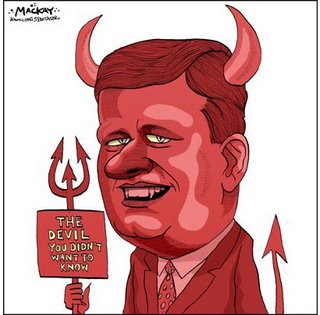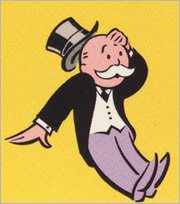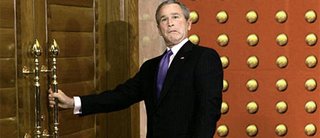
In an interesting article on the German Right Wing Conservative revisionist Carl Schmitt, who is the father of modernist conservative anti-parlimentary/ anti-liberalism, Matthew Sharpe contends that Schmitts theories apply to the Howard Government in Australia.
| Australian conservatism & Carl Schmitt |
What kind of conservatism (understood as non-liberalism) is emerging in Australia? I have mostly tracked this in terms of a hostility to multiculturalism, the national security state, the war on terror and hostility to Islam. I have taken it no further than this apart from gestures to Burke and Schmitt. AlI I've done is introduce Schmitt's idea of state of exception into the discussion as this is what the war on terror stands for.
Matthew Sharpe, in an article entitled A Coincidentia Oppositorium? On Carl Schmitt and New Australian Conservatism in Borderlands, argues that the new conservatism emerging in Australia has its roots in a different political paradigm to the Burkean one that is usually invoked by Tony Abbott and John Howard. Sharpe says that:
...my contention in what follows is that the recent revival within Western academe of the thought of authoritarian political theorist Carl Schmitt - already one more very interesting sign of the times - becomes only more interesting. For Schmitt's radical conservatism did not draw its inspiration from Burke. His conservative heritage instead came principally from Cattholic counter-revolutionaries Joseph de Maistre, Archibald de Bonald, and Donoso Cortes. This essay will read Schmitt's political theory as it were from within today's Australia, in the light or the quickly-changing shadows of our political times.
In fact they apply equally to the leadership style and politics of RH Stephen Harper as well. He has created a crisis of state over major issues, such as the Accountability act when he appeared in the Senate, the first Prime Minister ever to do so, to tell them to pass his act or else. Or else what? Face an election. On every issue that he has faced opposition over he challenges from a position of power; call an election. Knowing the opposition won't.
Matthew Sharpe
A Coincidentia Oppositorium? On Carl Schmitt and
New Australian ConservatismAfter having deliberated on these theoretical matters, let me return to present political concerns, and the question of whether our circumstances allow us to say that a new political conservatism is emerging much closer to Schmitt's than to Burke's. A recent essay on "The Life and Legacy of Carl Schmitt" concludes with the ominous affirmation that "for better or for worse, the actuality of Carl Schmitt will soon become apparent" (anon., 2005).
In Part I of this paper, we saw how Schmitt's prescriptive positions are built around a strident critique of parliamentary liberalism, the "murky indistinctions" of its procedures, and its founding, internally divisive and existentially debilitating, faith in "unending discussion". The features of Schmitt's critique, I suggested, do strikingly anticipate the rhetoric, and many of the policies, of the Howard government in Australia which distinguish it from its Liberal predecessors.
In Part II, we proposed that Schmitt's thought can be differentiated from that of Burke and the anglophone conservative tradition, because it is above all a post-traditional conservatism. Schmitt is under no illusions about the sufficiency of a solely conservative appeal to tradition in the face of political liberalism, and the emerging social democracy of the twentieth century. Although Schmitt recognises the value of tradition or myth in generating cultural unity, that is, his fear that liberalism might collapse the "friend-enemy" distinction push him towards actively advocating the construction of new conflicts - for the sake of generating some post-traditional simulacra of the traditions uniting pre-modern societies. This move is carried out by him through the construction of an authoritarian theory of a decisionist sovereign defended for His existential "decisiveness" in the face of enemies and emergency alone, rather than by reference to any higher or inherited notion of the political good.
Harpers autarchic politics since gaining office reflect the politics of the crisis of the state that Schmitt adovcates. And it began with the crisis of morality of the Liberal party. The Conservatives used this as an excuse to manufacture a both a moral crisis of governance and a moral politcal response to it. As advocated by Schmitt.
The crisis of a dithering Liberal party, indecisive, unable to resolve its own internal party crisis vis a vis being the State allowed Harper to then act as an autarch in power, with is Schmittian Strong Man act. Since then the main theme of the Conservatives is that they are The New Government of Law and Order.
And he is attempting to get around the Constitution and parliamentary law,as advocated by Schmitt, through Senate Reform, privatizing the Wheat Board and with their Law and Order agenda.
Harpers first publicity act was to go out in uniform as Warrior King to visit the troops he sent to the front lines. And to go to war was not his toughest decision, it was a natural for the Schmittian autark.
In fact Harpers whole politics reeks of Schmitt. His self created political image; the strong man, decisive, decision maker, damn the torpedos. Unlike Mr. Dithers.
The crisis in the last parliment was a Schmittian construct, the Liberals legalistic approach compared to the Conservatives political approach. The Liberals wanted wrong doers exposed, the Conservatives knew who the wrongdoers were, the Liberal Party as a whole, and they wanted them punished.
Harper has adopted the mantel of the Soverign. "The Peoples Soverign", and through his New Government of Canada the people are soverign. Not the politicians. They are not the real voice of the people, the real voice is Harper and his minority government. Best expressed in his outburst that only the Conservatives are the voice of the West and Western Farmers. So Damn the Constitution I will just go around it is his motto as it waqs for the Reform Party.
His is a short term government, one that face replacement by the Natural Governing Party; the Liberals. He must change Federalism and the Federalist State forever. In order not to allow the state to fall back into the hands of the Liberals, Harper must make irrevocable changes in the structure of the State, before he hands it back to the Liberals.
And he has only one chance to that. So his autarchic approach is not personal, a quirk, but is political, a Schmittian purge of all that is Liberal in the Canadian State. And this can be seen by the constant refrain of the Conservatives chanting You had 13 years and you did nothing, every time the Liberals say anything. The party of the Strong Man will do something. Because it may be the only chance they get.
Carl Schmitt - Wikipedia, the free encyclopedia
In 1921, Schmitt became a professor at the University of Greifswald, where he published his essay "Die Diktatur" ("On Dictatorship"), in which he discussed the foundations of the newly-established Weimar Republic, emphasising the office of the Reichspräsident. For Schmitt, a strong dictatorship could embody the will of the people more effectively than any legislative body, as it can be decisive, whereas parliaments inevitably involve discussion and compromise:
“If the constitution of a state is democratic, then every exceptional negation of democratic principles, every exercise of state power independent of the approval of the majority, can be called dictatorship.”
And Schmitt had a huge influence on the Godfather of modern Neo-Con Politics; Leo Strauss, who influenced both the Bush Cheney Rumsfeld White House and the Calgary School. When I think Strauss and Schmitt in practice besides Harper I think of one of his Calgary School mentors; Herr Professor Ted Morton.
Undoubtedly, the easiest access, and the best introduction, to Schmitt's radically original and disturbing vision of politics is afforded by his slim but immensely suggestive treatise, The Concept of the Political. Far more insinuative than what its modest title claims, the treatise forms, according to Leo Strauss, perhaps the most incisive and astute commentator of this infamous text, 'an inquiry into the "order of human things",... into the State.' Instead of offering an exhaustive and academic definition of the political, Schmitt conceptualizes it 'within the totality of human thought and action', in terms of the primordial and seminal antithesis between 'friend' and 'enemy': 'just as in the field of morals, the ultimate distinctions are good and evil, in esthetics, beautiful and ugly, in economics, profitable and unprofitable, so the significantly political distinction is between friend and foe.' For Schmitt, then, the political is primordial; it comes before the State and transcends its mundane and routine policies. It reveals itself, historically, at the foundational moment of the polity, and conceptually, in the unwritten metaphysics of the constitution. Indeed, the political in the specifically Schmittian sense incarnates existential totality and determines a choice between being and nothingness.[PDF]
Carl Schmitt in English
See:
Stephen Harper
Autarky
Autarch
Find blog posts, photos, events and more off-site about:
Stephen Harper, Harper, NCC, Reform Party, Conservatives, Conservative Party, politics, Government, PM, Ottawa, Canada,
Leo Struass, Calgary School,Carl Schmitt,Burkean Conservative,Harper





